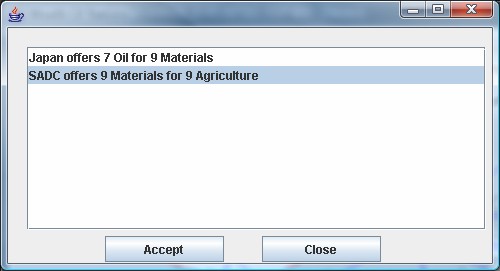Wealth Of Nations
Introduction
Wealth Of Nations is a macroeconomic game based very loosely on Keynesian economics (if you want the full story see the section on design), with a little mili-diplomacy thrown in for good measure. The name is copied, of course from Adam Smith's magnum opus on the topic, and I kind of like it as, after your first win, you can say "I WON one WON." As one of the "G8," the reformed Group Of Eight that controls the world's largest economies, you must use a combination of economic production, military prowess, and politicking to be the ultimate leader of the organization. Other members, however, can effectively trip you up if your plans are too obvious.
Backstory
It was that grin, bigger than life on the fifty inch
plasma TV. Bluebridge could actually see brilliant glints coming off the
pearly white teeth set in a face chock full of boyish charm. To his
left, in one of the over padded red leather chairs, Dmitri harrumphed.
Bluebridge glanced over with a raised eyebrow.
The Russian and Bluebridge couldn't have been more different. Bluebridge
was thin and wiry; Dimitri was barrel chested despite his age and had
arms with muscles that ahd "Schwarzenegger" written all over them. Bluebridge was balding, with
nothing more than slight wisps of hair left. The Russian had thick gray
hair the consistency of steel wool. Bluebridge was tall and lanky, the
Russian was short and stocky. Despite the physical differences, however,
Bluebridge had come to respect the man as a kindred spirit, by which
Bluebridge meant that when it all came down to brass tacks, both
of their rather impressive intellects were focused almost exclusively on
money. Some might call it economics, or even politics, but at its most
basic, fundamental level, both of those were really about dollar bills.
When you can down to it, so was pretty much everything.
Dmitri, the Russian Minister of Finance, waved his small snifter of dry sherry at the screen. "Your
President, he smiles too much."
"The most charismatic president since Kennedy" said Bluebridge in way of
response, a quote from numerous newspapers and magazines.
"In Russia, it would be considered frivolous. Medvedev actually takes
glowering lessons for several hours each day, at a rather outrageous
price of six hundred Rubles an hour."
Bluebridge made a mental note to review the rate for the President's
smile management sessions. "Unfortunately, head of state for any of the developed countries
is more form than substance these days. The respective heads of our
countries can't possibly have the time to learn the nuances of economic
policy when they have weighty matters such as glowering to attend to."
Dmiti nodded in agreement and raised his sherry in a mock toast.
"Fortunate for you and I, perhaps, that the world is now such a
complicated place that they must take our advice as gospel."
Bluebridge turned the conversation to lighter subjects, touching on
credit spreads, eurodollar futures, exchange rates, and all the other
banter that made a dollar much more than a piece of paper with ink on
it. Dimitri responded in kind, and after the verbal fencing match, they
broke up for the evening, both satisfied that they had, in some measure,
made progress in understanding each other's position, particularly with
respect to the Southern Alliance of Democratic Countries, or SADC.
Who would have thought even ten years ago that the Drug Cartels of
Columbia and surrounding countries would not only supplant the local
governments but do such an effective job at it that the northern half of
South America was a super power in its own right?
After Dimitri had left, Bluebridge turned back to his office, which
looked regal and antiquey and had more electronics than the five Joint
Chiefs had in their respective command centers. Combined. He touched
subtle buttons, and screens rose from desktops or appeared on walls as
sliding panels exposed them.
From here, he could monitor the major stock markets, the foreign
currency
exchange servers, gather real time economic data from more than three
thousand of the US's largest companies, and much, much more. He could
also shift money between the Federal Reserve Banks, change cash flows to
various military installations, modify fees and tariffs to encourage
exports to some countries and discourage exports to others. Dmitri had
it a little easier, with the Russians still clinging to quota systems
that gave him more direct control. Bluebridge, however, appreciate and
enjoyed the more subtle techniques he used to control the economy, the
military, and, for all practical purposes, the country.
After all, it really did come down to money, and as head of the Federal
Reserve, he controlled the money.
Wealth Of Nations (WON)
Overview
In WON, you play one of eight superpowers whose economies make them the source of the world's products, from cosmetics to MP3 players. The rest of world is broken into eight less lucky regions, who make enough to purchase your leftover toaster ovens and mopeds by selling resources to the G8. G8 countries, of course, have their own natural resources that provide a background hum of economic activity, and moreover, by investing in improving infrasturcture, you can make that background hum even stronger. As a superpower, of course, you have more than manufactured products to make you effective in the world markets; any third world country would be sadly mistaken to ignore your military might if it is in any position to intervene.
Set up
Click on the link below; if you have a recent version of java it will download automatically. Go to "Game" "Restart Game" and select the DEMO game... say "Yes" when it warns you it will overwrite existing game data. Then go to "Game" "Open" and open the game you just restarted. If you don't see a demo game, try to configure one through the "Game" "Configure" menu, and if that doesn't work, contact me!
http://www.agirauniverse.org:8180/gfw/won.jnlp
The game board
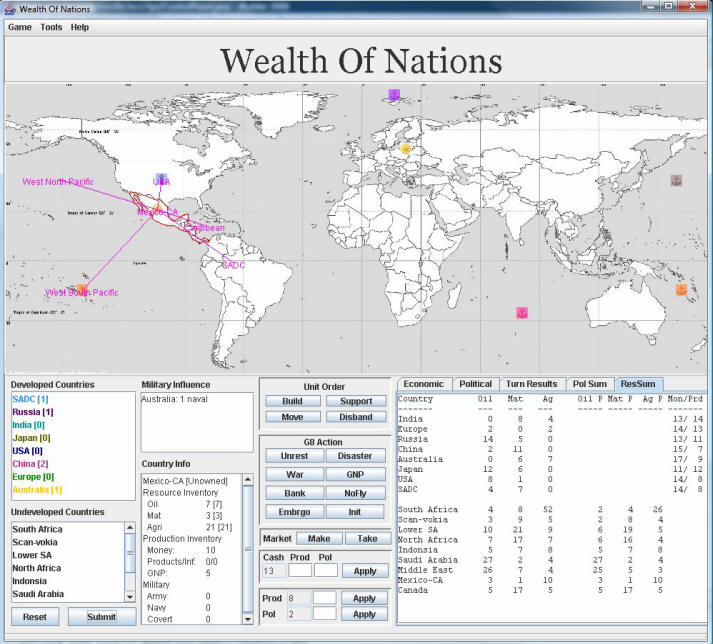
Terminology
G8 - The eight superpowers that are the manufacturing economies of the world
non-G8 - The eight regions that export raw materials to the G8.
Products (Prod) - Manufactured products that can be traded with the non-G8. You build products by expending money, building one product for each money unit spent.
Political Influence (Pol) - Points used to make the non-G8 countries think you have a special place in your heart for them... if you spend more on them than the other guy. You get one Pol / Influence point for each money unit spent.
Resources - Natural resources that can be turned into money, specifically Oil, Raw Materials (Mat) and Agricultural (Ag) items.
Money - The economic lifeblood of the G8. Money is produced as a result of internal production (measured by GNP) and by gathering one of each type of resource (that is, if you gather a Oil, Mat, and Ag, it automatically turns into 1 money unit).
The Economic Cycle
The economic cycle is simple. You have cash that you can turn into Products (Prod) or Political Influence Points (Pol). Products can be sold in non-G8 countries, for which you will receive a pro-rated number of that country's resources (that is, if you and two other G8 countries both expend 1 product in the non-G8 country, you will split the countries resources three ways, barring other factors). Once you've collected resources from the countries, all matched sets are converted back into cash (that is, if you have 4 Oil, 8 Mat, and 11 Ag, you will end up with 4 money units, 0 Oil, 4 Mat and 7 Ag). You will also get your GNP in money units at the beginning of the turn; if your GNP is 5, you will end up with 9 money units with the two combined.
There is also a secondary market for resources. These are private deals between G8 countries to balance resource needs (and is explained further below).
Military Effect
Military presence makes your products more sellable to the non-G8 countries. Prorated military influence can up to double the value of your products. That is, if there are three G8 countries spending 1 each, and the first two each have 1 military influence on the non-G8 country, they have an effective 1.5 units of products, and will get 1.5 / (1.5 + 1.5 +1) = 3/8 = 37% instead of 33%; if only one country has military influence it will get 2/(2 + 1 + 1) = 50%.
Effect of Unrest and Natural Disaster
Non-G8 countries can be in unrest (frown icon) and/or have a major natural disaster (X icon). These do not directly affect bidding, but they do affect country production of raw materials. Each reduce production by 1/2 (1/4 if both are in effect at the same time). Unrest and Disaster can only be removed by a G8 country.
Politics
You can be the benefactor of one or more non-G8 countries by expending Political Influence points on them. The G8 country that has expended the most points over time is the "preferred nation" and gets two benefits:
-
You get 1 VP each turn for each "preferred nation" status
-
You get any resources that cannot be divided evenly into the G8 nations that are selling products
For instance, if a country has 7 Oil, 11 Mat and 9 Ag, split between three G8 countries, they would get 2/3/3 and you would get 1/2/0.
Political influence points are wiped out if there is ever a war in the country.
The Military
Military units are broken into four categories, and each have strengths and weaknesses. They are described below. Important terms are span of control and span of movement. Span of control are the non-G8 countries and oceans that can trace a direct supply line (route though areas you have army or naval units in) back to your home country. Span of movement are non-G8 countries or oceans that are in or adjacent to your span of control. So, if you are the US and you have a naval unit in the North Atlantic, and a Army unit in Scan-Vokia, your span of control contains those areas, and your span of movement contains those, the Arctic Sea, Southern Atlantic, Mediterranean, and the Middle East.
All units are created in your home country. All units have a cost: 3 for a covert unit and 5 for other types of units. All units have a maintenance cost: 2 for Armies, Navies, and Air units, 1 for Covert units. Australia and Japan pay only 1 for maintaining Naval units.
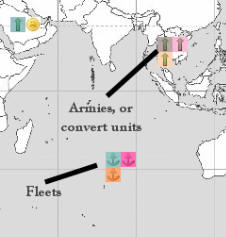 Armies, Covert, and Fleets |
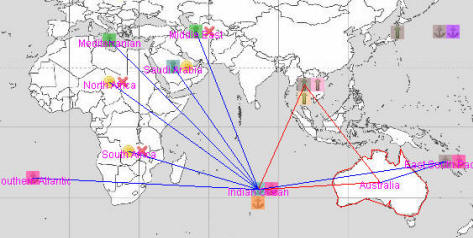 Red lines = Span of control, Blue = Span of Movement |
Army units
Army units can move anywhere within your span of movement. They must end up within your span of control at the end of the turn or they are destroyed. They provide 2 military strength in the country they are in. They can start wars. They cost 1 to move.
Naval units
Naval units can move to any adjacent ocean space. They provide 2 military strength in the ocean they are in and 1 in any adjacent ocean or country. They do not have to be in your span of control at the end of the turn, but if they are not, they do not project power into adjacent spaces. They can start wars. They cost 1 to move.
Covert units
Covert units can move anywhere within your span of movement. They are not affected if they are not within your span of control at the end of the turn. They provide 1 Military strength in the country they are in. If they are in a country that has a war, they are automatically destroyed, even for the victor. They can start wars (but will be destroyed by them). They do not expand span of control. They cost nothing to move.
Air units
Air units can move anywhere on the board. They project 1 military strength in the ocean or country they are in. They do not affect span of control. They cannot start wars (but can participate in them). They cost nothing to move.
Game Orders
Military Orders
There are four military orders; build a unit, move a unit, disband a unit, and put a unit in support. Putting a unit in support transfers the unit to another player for the war and allocation phases. You can combine disband, move, and support orders (but disband comes before war and allocation so it wouldn't make much sense).

Secondary Market
You can trade resources on the secondary market. You can offer to trade a specific number of resources of one type for a specific number of a second type. Making a secondary market offer costs 1 money unit. Accepting a secondary market offer is free; if several G8 nations accept the offer, the first in the initiative chain gets the offer. The "Make" button brings up the "make a secondary market offer" dialog box. The "Take" button brings up the offers available for the turn.
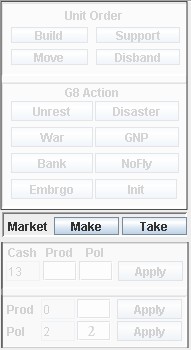 |
make or take an offer
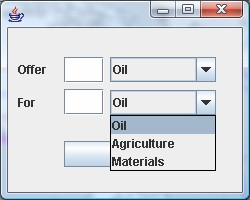
|
Allocation orders
You can allocation some or all of your money to producing products or political influence. You can allocate your products and Influence into a non-G8 country. Select the non-G8 country on the map or the undeveloped countries list to enter values in the Prod and Pol amount text boxes, entered the desired amount, and press "Apply."
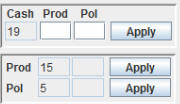
G8 orders
At the yearly summit you may throw your weight around and execute one and only one G8 order. These are:
-
Grow GNP - add one to your GNP.
-
Init - go to the top of the initiative list (the G8 country list). Since some of the orders below are executed in initiative order, it gives you an edge.
-
NoFly - cause a ocean or non-G8 country to be declared a military "off limits" area. Units my not move into (but may move through) a NoFly zone, and war cannot be declared there.
-
Embargo - cause a non-G8 country to forego allocations and production for the turn.
-
Bank - borrow money from the World Bank; pay back it plus 20% interest. You may not borrow more than your GNP, and you lose a victory point for each money unit you owe at the end of the game.
-
Unrest - Clear unrest from a non-G8 country. This is done in order, higher initiative winning. It also gives you political influence points, 5 or the difference between you and the current leader - 1, whichever is more.
-
Disaster - like unrest but for natural disasters.
-
War - Declare war in a non-G8 country or Ocean.
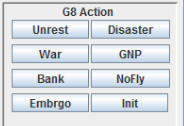
Wars
War has the following effects:
-
The country with the most military influence is the winner; ties are broken by the person initiating the war, and by initiative if that is insufficient.
-
All losing units are destroyed.
-
If the war is in a non-G8 country, all political influence is removed and the country goes into unrest and natural disaster.
-
If the war is in an ocean, all adjacent non-G8 countries go into unrest.
Winning
You get victory points for two things:
-
VP collected each turn for being the favored nation.
-
5 VP every turn if your span of control includes 4 non-G8 countries.
First to 30 points wins...
Good luck!
Design
And a little bit about design, game design, reality and game reality. WON was originally envisioned as a Keynesian Macroeconomic model wrapped in a enigma wrapped in a riddle, aka a game. The name was really a misnomer; Adam Smith's "Wealth Of Nations" was classic macroeconomic theory with a bit of preaching thrown in, but came down to Say's law, which, simplified, claims economics is a zero sum game; what you spend to make something is spent buying the thing you made. Keynesian theory expands on that a bit, with the idea that, sure, it's a zero sum game, but the SUM can change; that is, unpredictable events can cause the supply and demand for goods to no longer match the real production capability of the country, meaning you have unemployment and other effects. The main difference (which makes the two theories considered diametrically opposites of one another) is that Smith believed markets would tend toward full production equilibrium independent of outside influence, where as Keynes believed that perturbations in the markets could be disastrous and could be controlled by appropriate government fiscal policy, which makes for a much more interesting game.
So I designed a macroeconomic model a Republican would love, with money flows between business and individuals and the government, and within the government to military and welfare and services, each with their own flows back to business and individuals. And modeled propensity to spend and propensity to save, with savings tied to investing in business tied to improvements in efficiency which improved GNP. And inflation and unemployment. And floating exchange rates between countries based on inflationary pressures. You controlled things on a macro level with taxation rates on businesses and individuals, and borrowing rates with Fund Fund Effective (the rate at which you loan money to business). And the Republican ideal was that lower tax rates increased propensity to save which was the key to growing GNP, but it sometimes resulted in high inflation which... well, anyway, it was a reasonably complicated model that you controlled with the macro-level controls and then, more precisely, with the actual cash flows by percentage going to the different governmental bodies.
And it was really boring.
So I added a military component to the game, which was little more interesting, and then added a political component to the game, which was a little more interesting. But the core of the game remained moving sliders around to change percentage allocations to get markov-chain-like effects a few turns downstream, which remained so abstract and finicky that it was boring.
So I revamped the economic model to something much, much simpler, made the percentages actual units of stuff you moved around, made currencies an equivalently simple unit model, and let the player allocate things rather than percentages. And that was a lot better, but it kind of shot the entire Keynesian model thing in the head. So now I'm back to the Adam Smith simplistic zero-sum laisse-faire economic model, with military and politics thrown in to spice things up. And the name of the game is much more appropriate.
I hope you enjoy it.
